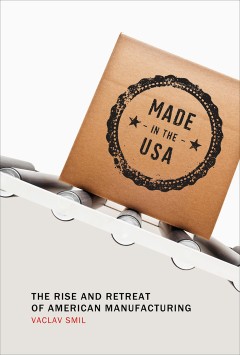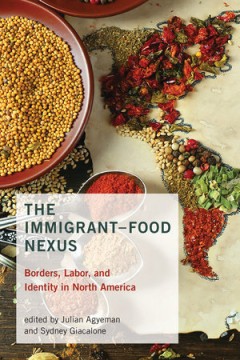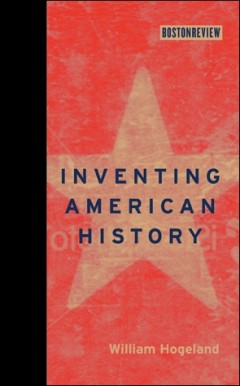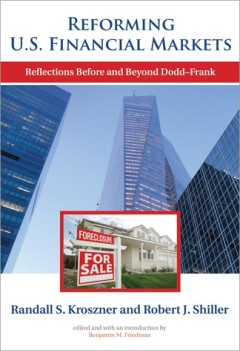Filter by

Made in the USA :the rise and retreat of American manufacturing
"In Made in the USA, Vaclav Smil powerfully rebuts the notion that manufacturing is a relic of predigital history and that the loss of American manufacturing is a desirable evolutionary step toward a pure service economy. Smil argues that no advanced economy can prosper without a strong, innovative manufacturing sector and the jobs it creates. Reversing a famous information economy dictum, Smil…
- Edition
- -
- ISBN/ISSN
- 9780262316743
- Collation
- 1 online resource (xiii, 263 pages) :illustrations
- Series Title
- -
- Call Number
- -

The immigrant-food nexus :borders, labor, and identity in North America
The intersection of food and immigration in North America, from the macroscale of national policy to the microscale of immigrants' lived, daily foodways. This volume considers the intersection of food and immigration at both the macroscale of national policy and the microscale of immigrant foodways--the intimate, daily performances of identity, culture, and community through food.OCLC-licensed …
- Edition
- -
- ISBN/ISSN
- 9780262357555
- Collation
- 1 online resource (344 pages).
- Series Title
- -
- Call Number
- -

Oil, illiberalism, and war: An analysis of energy and US foreign policy
The United States is addicted to crude oil. In this book, Andrew Price-Smith argues that this addiction has distorted the conduct of American foreign policy in profound and malign ways, resulting in interventionism, exploitation, and other illiberal behaviors that hide behind a facade of liberal internationalism. The symbiotic relationship between the state and the oil industry has produced dev…
- Edition
- -
- ISBN/ISSN
- 9780262327527
- Collation
- 1 online resource (xxxiv, 210 pages) :map
- Series Title
- -
- Call Number
- -

Thinking Strategically: The Major Powers, Kazakhstan, and the Central Asian N…
More than ten years after the breakup of the Soviet Union, none of the major powers, including Russia, has developed a cohesive geopolitical strategy for dealing with the countries and regions that once made up the USSR. Even after September 11 and the sudden importance of Central Asia in the struggle against global terrorism, the United States continues to deal with the region in fragmented an…
- Edition
- -
- ISBN/ISSN
- 9780262278133
- Collation
- 1 online resource (xii, 243 pages).
- Series Title
- -
- Call Number
- -

Indecision Points: George W. Bush and the Israeli-Palestinian Conflict
"Although George W. Bush memorably declared, 'I'm the decider, ' as president he was remarkably indecisive when it came to U.S. policy toward the Israeli-Palestinian conflict. His administration's policymaking featured an ongoing clash between moderate realists and conservative hard-liners inspired by right-wing religious ideas and a vision of democracy as cure-all. Riven by these competing age…
- Edition
- -
- ISBN/ISSN
- 9780262326186
- Collation
- 1 online resource (xi, 227 pages).
- Series Title
- -
- Call Number
- -

American hegemony and the postwar reconstruction of science in Europe
How the United States used its position as the world's leading scientific and technological power to rebuild European scientific practices and institutions and align them with American interests during the first two decades of the Cold War.OCLC-licensed vendor bibliographic record.
- Edition
- -
- ISBN/ISSN
- 9780262277631
- Collation
- 1 online resource (viii, 376 pages).
- Series Title
- -
- Call Number
- -

Debating the Good Society: a Quest to Bridge America's Moral Divide
Debating the Good Society probes two questions lying at the heart of the ongoing culture war incontemporary America: Where does goodness come from, and how is goodsocial order to be achieved?Through the ingenious means of a fictional Internet conversation among two dozen or so Americans from various walks of life and every shade of the ideological spectrum, Debating the Good Society probes two …
- Edition
- -
- ISBN/ISSN
- 9780262283175
- Collation
- 1 online resource (371 pages)
- Series Title
- -
- Call Number
- -

Inventing American history
American public history—in magazines and books, television documentaries, and museums—tends to celebrate its subject at all costs, even to the point of denial and distortion. This does us a great disservice, argues William Hogeland in Inventing American History. Looking at details glossed over in three examples of public history—the Alexander Hamilton revival, tributes to Pete Seeger and …
- Edition
- -
- ISBN/ISSN
- 9780262254960
- Collation
- 1 online resource (xiv, 132 pages).
- Series Title
- -
- Call Number
- -

Reforming U.S. financial markets :reflections before and beyond Dodd-Frank
Papers and discussions presented at the fifth Alvin Hansen Symposium on Public Policy, held at Harvard University on April 30, 2009."Over the last few years, the financial sector has experienced its worst crisis since the 1930s. The collapse of major firms, the decline in asset values, the interruption of credit flows, the loss of confidence in firms and credit market instruments, the intervent…
- Edition
- -
- ISBN/ISSN
- 9780262295956
- Collation
- 1 online resource (xvii, 152 pages)
- Series Title
- -
- Call Number
- -

When the President calls : conversations with economic policymakers
OCLC-licensed vendor bibliographic record.
- Edition
- -
- ISBN/ISSN
- 9780262355513
- Collation
- 1 online resource (680 pages).
- Series Title
- -
- Call Number
- -
 Computer Science, Information & General Works
Computer Science, Information & General Works  Philosophy & Psychology
Philosophy & Psychology  Religion
Religion  Social Sciences
Social Sciences  Language
Language  Pure Science
Pure Science  Applied Sciences
Applied Sciences  Art & Recreation
Art & Recreation  Literature
Literature  History & Geography
History & Geography